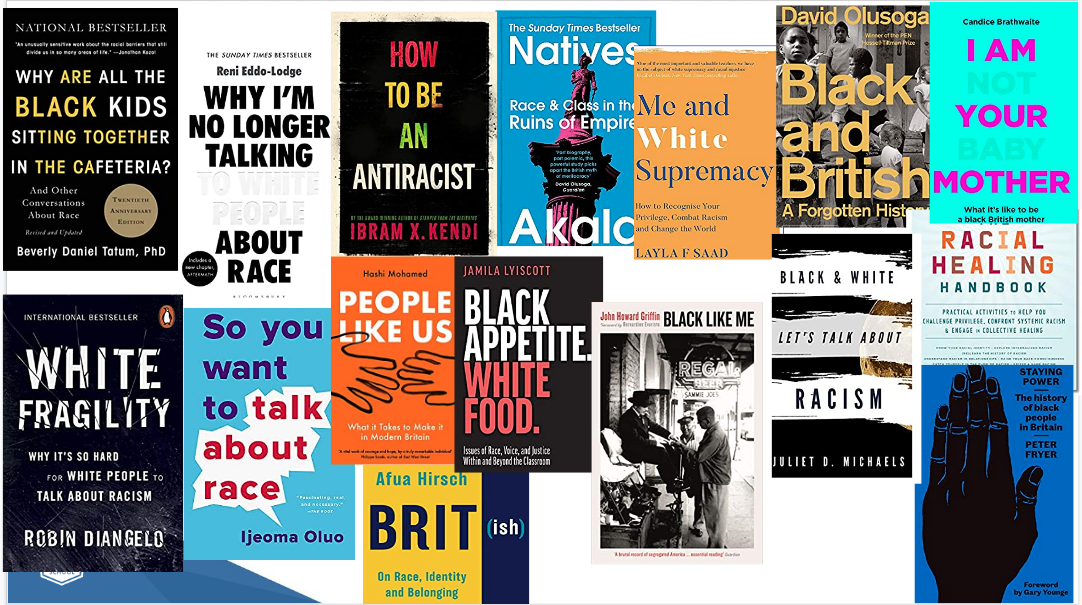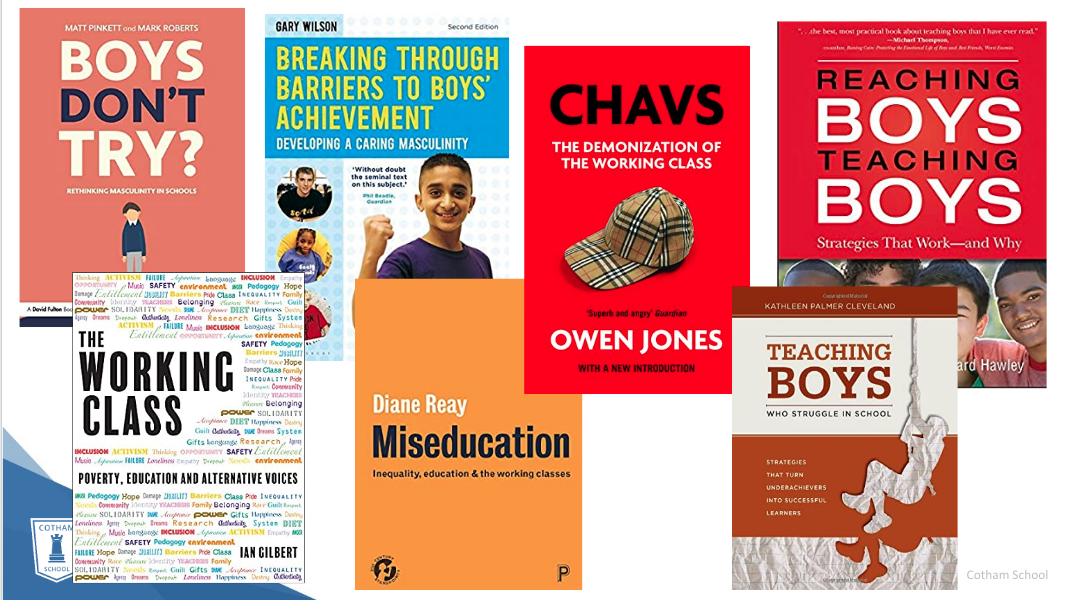Equalities: Our Anti Racism Work
Developing Racial Literacy
In July 2019, the senior leadership team launched Unconscious Bias training with all staff. We addressed how the research evidence looks at how unconscious bias impacts BAME students in a number of ways including: teacher expectations and grade bias; use of ‘over-praise’ due to stereotypes; labelling and self-fulfilling prophecies; identity economics and confirmation bias. Using this research, the training included how to actively move from a ‘colour-blindness’ approach to a ‘colour-conscious’ approach evidenced from a move to including and celebrating the positive societal contributions from BAME people in all aspects of school life. This training was also informed by ‘student voice’ which saw students asking for more opportunities to talk about race, identity, black achievement, black history and local/national news events. The training served as the launch for the further training, initiatives and actions that have continued to grow, develop and improve over the course of these past two years. This emphasis on tackling unconscious bias further informed our Teaching and Learning strategy, the diversifying of the curriculum and further leadership training focusing on race identity and anti-racism. This unconscious bias training continues to be delivered to all new staff as the main part of our New Staff Induction programme as well as all training for Initial Teacher Trainees working with us from various teacher training programmes.
The focus of staff development in this area now is to work on their racial literacy in order to confidently address issues of race with students, teach a more diverse curriculum, and be able to address incidents of discrimination and inequality that might occur.
Social Justice Library
We recognise that anti-racist educators understand that anti-racist work begins with the self and that it is only through grappling with personal mindsets, philosophies and biases that real progress will be made. Therefore, to further resource and train our staff we set up and continue to update a social justice library that contains many titles. This library is open and available to all staff and staff are frequently reminded of this resource both in training sessions and in written correspondence.
 |
 |
Cotham School’s Anti-Racist Educators
Cotham has a Strategy Group, first set up in 2017, that meets every term and has members from across all roles and responsibilities in the school. This group is working towards five main objectives which include: Create a culturally inclusive curriculum; Increase BAME parental engagement (with a focus on African Caribbean and Somali parents); Create a culturally inclusive school environment; Develop BAME student empowerment and leadership and implement anti-racist school practices. This group facilitates wider conversations about race, equity and diversity as well as inviting outside speakers into the school to address issues of race and identity. The objectives are mostly centred on our BAME students and giving them access to increased leadership opportunities, mentoring, assemblies, small group intervention work and extracurricular enrichment opportunities. These objectives form part of the school's overall action plan for the Anti-Racist School Award.
The curriculum
Our curriculum helps develop cultural capital, recognises Bristol’s diverse local history and achievement, provides enriching experiences, links learning to the wider world including current affairs and social issues and engages students in thinking about ‘big ideas’ outside of their life experiences. In addition to this, our curriculum serves to encourage disadvantaged students to diversify their interests e.g. taking up arts-based subjects and widening their extracurricular interests. The curriculum also has intentional, planned opportunities to develop oracy skills, literacy and numeracy skills and with clear links and references to real world applications and future careers, whilst seeking to highlight diversity and inclusion through the celebration of BAME/Disability/LGBTQIIA+ achievement and history.
Teaching, Learning and Assessment strategy
Cotham’s Teaching, Learning and Assessment strategy (TLA) includes a focus on mitigating unconscious bias in the classroom and this continues to inform the continual professional development of all teaching staff. Further training has been invested in ensuring that all staff are addressing unconscious bias in their classrooms including: Recognising that everyone has unconscious biases and these need to be identified; avoiding snap decisions and considering assessment criteria carefully; incorporating examples which question stereotypes and value diversity; encouraging participation of under-represented groups in class; adopting an affirming approach; creating an atmosphere of openness in discussing biases and best practices to minimise them; acknowledging and discussing institutional mistreatment openly; observing classroom practice through an ethnicity lens; inviting BAME speakers and visitors in as role models and to celebrate black achievement and ensuring displays and artefacts are representative of all the cultures in Bristol.
Restorative Approaches to behaviour
In a school where so much work is being done on tackling unconscious behaviour as well as diversifying the curriculum it was important that staff then received further training in how to bring a restorative approach to behaviour and embed this in the school systems and policies. In October 2019, all staff received external training in the importance and techniques that underpin restorative approaches and further intensive training was given to members of the senior leadership team, inclusion team and pastoral team to ensure that everyone could conduct restorative conversations and conferences after a relationship breakdown between students and staff. This practice is still being embedded and the first step in this process was to get rid of our withdrawal classroom which was disproportionately occupied by BAME students; this was not achieving the desired changes in behaviour and was one of the biggest reasons why we have decided to move to a more restorative approach where relationships can be rebuilt, students and staff can take responsibility for any parts they played in the breakdown of the relationship or poor behaviour and positive, rebuilding actions can be set. All the research points to this resulting in more cases of sustained changed behaviour and stronger, more respectful relationships between staff and students. Link here to the organisation that conducted this training with us.
Our Response to the murder of George Floyd and resulting protests in Bristol
In the wake of protests and marches that occurred in the wake of the murder of George Floyd, the senior leadership team published an open letter to all students and staff addressing the need for change. The letter firmly addressed the importance of not shying away from hard truths, in a world that is crying out for people to not remain silent in the face of injustice and brutality. We wanted to explicitly recognise that it is not the sole responsibility of our BAME students and staff to speak out about the need for change to eradicate racism but that this responsibility belongs to us all. We also responded to a letter sent from 600 Cotham School Alumni and shared more anti-racist resources with parents and our community.
Anti-Racist staff training
In September 2020, we delivered whole staff training on Cotham’s journey to becoming an anti-racist school. Building on our unconscious bias work, staff were given the opportunity to consider what being ‘anti-racist’ means; to hear some student and staff about their thoughts on racism and how they must navigate the impact of racism in their lives and to consider the plans to move beyond surface level initiatives and how everyone might become involved in this journey. It was important to address how racism affects the lived experience of BAME people and how racism is systemic, and has been part of many foundational aspects of society throughout history, and can be manifested in both individual attitudes and behaviours as well as formal (and "unspoken") policies and practices. The final aspect that we addressed was how white people can participate, often unknowingly, in racism.
Anti-Racist School Award: Carnegie School of Education (Leeds Beckett University)
As a part of this anti-racist work launched in September 2020, we have started working towards the anti-racist school award that looks at Governance, Leadership and Management; School Environment; Professional Learning and Development; Hidden Curriculum; Pedagogy and Curriculum and Parents/Carers and Community Partnerships. This award aims to improve race equality within schools while promoting safety and wellbeing for BAME staff, students, parents, carers, and those in the community. The first stage of this process has been to evaluate the extent to which we are taking a whole-school approach to anti-racism, identifying any gaps in which to develop and strengthen. This audit result was strong with a few areas to continue working on with our trained CRED professional associate coach, who will help to ensure that we meet a series of criteria before creating a personalised action plan using a development framework. We are committed to the long term work that is required for institutional change.
Race, Identity and School Leadership Programme
The leadership of this anti-racist work is shared by the senior leadership team, and therefore we have completed a Race, Identity and School Leadership Programme. The course provided the leadership team with the space and one to one support to address:
- Key principles of racial equality and social justice and what best practice looks like in individual school contexts
- Question and reflect on the prevailing narratives that have shaped the discourse on race, identity, education and the achievement of Black pupils
- Use a narrative enquiry framework to identify how to create personal and organisational narratives that support the achievement of pupils of different races and backgrounds
- Equip senior school leaders with the necessary psychological and emotional tools for engaging in difficult conversations about race
- Increase leaders own sense of personal agency and ability to act as an agent of change
This programme was facilitated by a trained coach.
Work with other organisations
Over the years, we have worked extensively with a range of organisations who are equally committed to addressing racial inequality; for example:
- One Bristol Curriculum - A city-wide project on diversifying the curriculum
- BAME South West Leaders Network - with the Office of the Regional Schools Commissioner - sharing experience, practice and useful resources on our journey towards becoming an anti-racist school
- Supporting other local schools with starting their journey towards addressing racial inequality
- BAMEed - a national grassroots organisation (the Deputy Headteacher is the regional chair)
- TALO - a local grassroots organisation on a long-term BAME girls empowerment project
- Integrate - undertaking a number of projects with gifted and talented BAME Pupil Premium students, and a female empowerment project
- Zazi - a long-term masculinity project
- Bristol ‘Big Conversation About Race’ - hosting a city-wide conversation for the local authority
- Bristol City Council - representing on the Race Equality in Education Steering Group
- Leeds Beckett University - Anti-racist school award
- Integrity Coaching - Race, Identity and School Leadership programme
- SARI - Stand Against Racism and Inequality - local organisation we regularly commission to deliver assemblies and workshops on racism and other forms of hate and prejudice
- Jubilee Head Teachers Network
- Youth Resilience Network UK
- CLF Institute - sharing experience, practice, and useful resources on our journey towards becoming an anti-racist school
- South West Network Strategy Group
- Challenge Partners
- Bristol NW24 network of schools
- Bristol Education Partnership (BEP)
